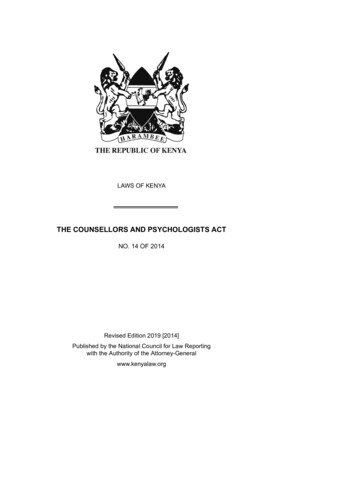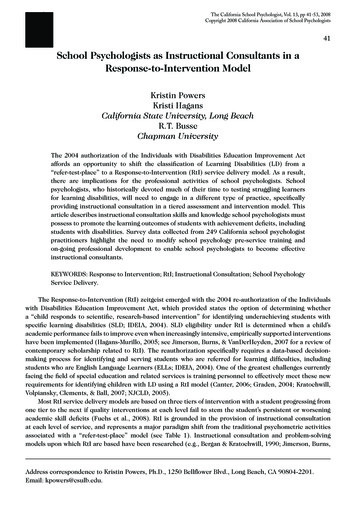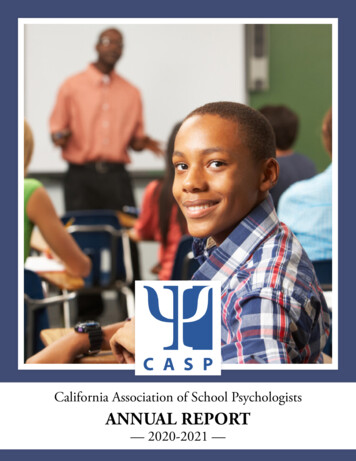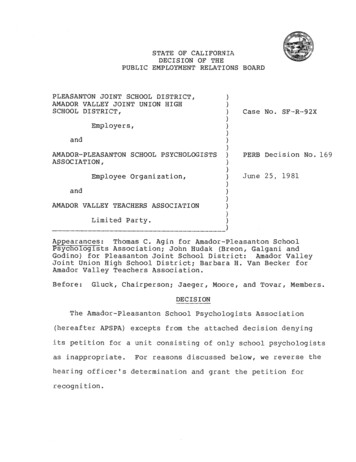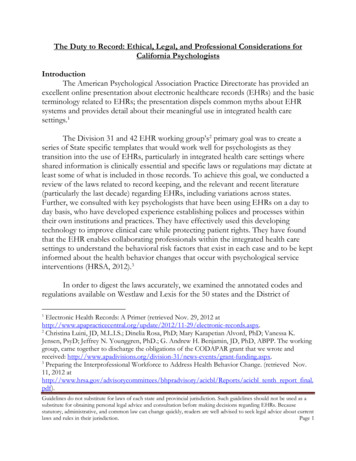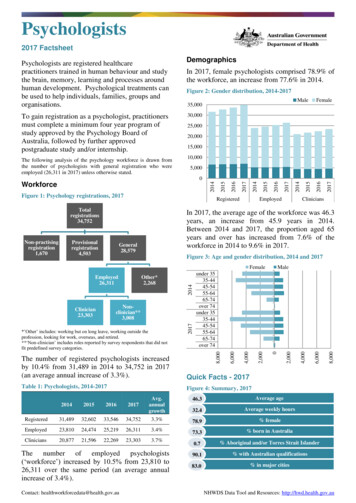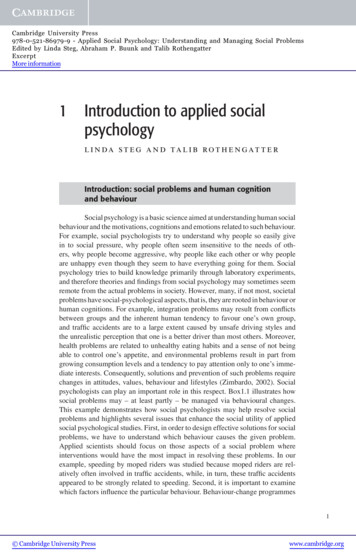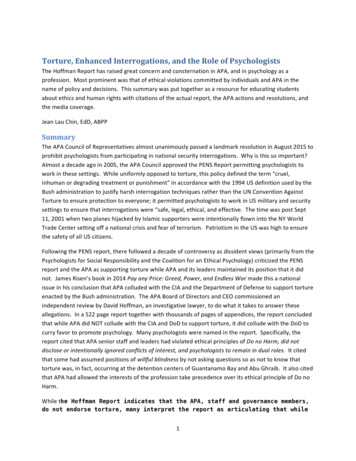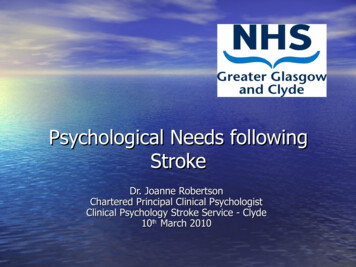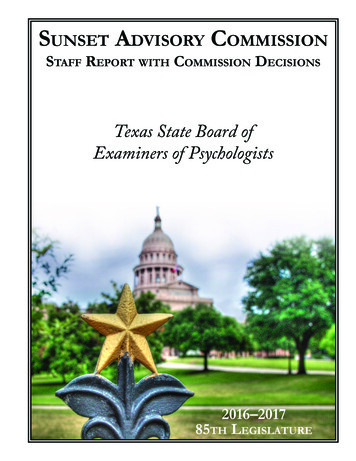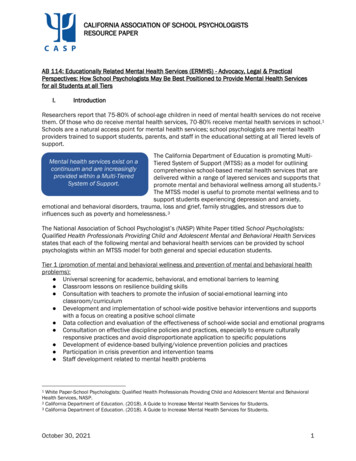
Transcription
CALIFORNIA ASSOCIATION OF SCHOOL PSYCHOLOGISTSRESOURCE PAPERAB 114: Educationally Related Mental Health Services (ERMHS) - Advocacy, Legal & PracticalPerspectives: How School Psychologists May Be Best Positioned to Provide Mental Health Servicesfor all Students at all TiersI.IntroductionResearchers report that 75-80% of school-age children in need of mental health services do not receivethem. Of those who do receive mental health services, 70-80% receive mental health services in school.1Schools are a natural access point for mental health services; school psychologists are mental healthproviders trained to support students, parents, and staff in the educational setting at all Tiered levels ofsupport.The California Department of Education is promoting MultiTiered System of Support (MTSS) as a model for outliningcomprehensive school-based mental health services that aredelivered within a range of layered services and supports thatpromote mental and behavioral wellness among all students.2The MTSS model is useful to promote mental wellness and tosupport students experiencing depression and anxiety,emotional and behavioral disorders, trauma, loss and grief, family struggles, and stressors due toinfluences such as poverty and homelessness. 3Mental health services exist on acontinuum and are increasinglyprovided within a Multi-TieredSystem of Support.The National Association of School Psychologist’s (NASP) White Paper titled School Psychologists:Qualified Health Professionals Providing Child and Adolescent Mental and Behavioral Health Servicesstates that each of the following mental and behavioral health services can be provided by schoolpsychologists within an MTSS model for both general and special education students.Tier 1 (promotion of mental and behavioral wellness and prevention of mental and behavioral healthproblems): Universal screening for academic, behavioral, and emotional barriers to learning Classroom lessons on resilience building skills Consultation with teachers to promote the infusion of social-emotional learning intoclassroom/curriculum Development and implementation of school-wide positive behavior interventions and supportswith a focus on creating a positive school climate Data collection and evaluation of the effectiveness of school-wide social and emotional programs Consultation on effective discipline policies and practices, especially to ensure culturallyresponsive practices and avoid disproportionate application to specific populations Development of evidence-based bullying/violence prevention policies and practices Participation in crisis prevention and intervention teams Staff development related to mental health problemsWhite Paper-School Psychologists: Qualified Health Professionals Providing Child and Adolescent Mental and BehavioralHealth Services, NASP.2 California Department of Education. (2018). A Guide to Increase Mental Health Services for Students.3 California Department of Education. (2018). A Guide to Increase Mental Health Services for Students.1October 30, 20211
CALIFORNIA ASSOCIATION OF SCHOOL PSYCHOLOGISTSRESOURCE PAPERTier 2 (direct and indirect services to address emerging mental and behavioral health problems andprevent risky behaviors): Suicide risk/threat assessment Protocols for responding to bullying Evidence-based mental and behavioral health programs (e.g., Check-In Check-Out) Counseling groups (e.g., social skills training, anger management, stress reduction) Assessment and interpretation of behavioral data to monitor response to interventions Development and monitoring of individual student behavior intervention plans Solution-focused groups Mentoring of students Facilitation of educator–family collaboration to address mental and behavioral health problems Facilitation of collaboration among family, school, and community to address mental andbehavioral health problems and understand the impact of cultural issuesTier 3 (direct and indirect services to address identified mental and behavioral health problems): Direct therapeutic services to all students in need, including individual and group counseling,even in the absence of a clinical diagnosis or identified educational disability Cognitive-behavioral therapy, behavior therapy, and dialectical behavior therapy Psychological assessment of social, emotional, and behavioral problems Suicide intervention and postvention Crisis intervention/crisis response Facilitation of collaboration among school providers with community agencies and other outsidemental and behavioral health providersThe ability of school psychologists to provide comprehensive mental health services to students issometimes influenced by Local Educational Agencies’ (LEA's) organizational dynamics. There are severalhurdles for school psychologists to navigate: Low school psychologist to student ratios High psychoeducational evaluation caseloads Competing district needs/priorities Lack of administrative approval, expectation, and support Division of roles with other school-based mental health professionals4II.Individualized Education Program (IEP) Driven Mental Health ServicesMental health services may be required for special education students to progress in their IEPprogramming if they provide meaningful educational benefit. For students qualified for a specialeducation program, Designated Instructional Service (DIS) counseling may be added. To better meet themental health needs of special education students, DIS counseling may be provided in a tiered fashion.These services may be referred to as Educationally Related Mental Health Services (ERMHS).Five questions accompanying these introductory paragraphs are considered for school psychologists andadministrators who are experiencing some of the above hurdles. The topics are also intended to addressconcerns of administrators who are unsure if ERMHS is within the school psychologist's scope of practiceHanchon, T. A., & Fernald, L. N. (2013). The provision of counseling services among school psychologists: An explorationof training, current practices, and perceptions. Psychology in the Schools, 50, 651–671. doi:10.1002/pits.217004October 30, 20212
CALIFORNIA ASSOCIATION OF SCHOOL PSYCHOLOGISTSRESOURCE PAPERand are therefore excluding school psychologists from the opportunity to provide ERMHS. The hope is toempower the reader to advocate for school psychologists as the natural mental health provider withinthe school system, inclusive of special education programming. The position of CASP is that schoolpsychologists are qualified school-based mental health professionals whose scope of practice includesproviding mental health services within all tiers of MTSS, including DIS Counseling and ERMHS.Regardless of the tier, school psychologists are uniquely trained to ensure all students have the mentalhealth support they need in schools. The questions address the following:Question 1: Historically, who has delivered counseling services to students eligible for special education?Question 2: What provider is best prepared to conduct ERMHS assessments and has that expertise beenupheld in court?Question 3: Is providing DIS Counseling/ERMHS counseling within a school psychologist's scope ofpractice?Question 4: What specific district ERMHS models, delivered by school psychologists, currently exist inCalifornia?Question 5: What resources are available to increase a school psychologist's counseling skills?III.Historical Delivery of Counseling ServicesQuestion: Historically, who has delivered counseling services to students eligible for special education?In 1975, school psychologists provided school-based mental health services to special educationstudents. In California, County Mental Health (CMH) providers were added in 1984.In 1975, the United States Congress guaranteed disabled children the right to a free appropriatepublic education, passing PL 94-142 (the Education for All Handicapped Children Act, amended asthe Individuals with Disabilities Education Act or IDEA). Under PL 94-142, all children, regardless ofthe severity of the handicapping condition, must be provided an education program designed tomeet the student's unique educational needs at no cost to the parent(s)/guardian(s), which is oftenreferred to as Free Appropriate Public Education (FAPE). Included in this principle is the concept ofrelated services (Designated Instructional Services in California Education Code §56363 (a)).Related services include those determined educationally necessary for a student to receiveeducational benefit. One of the services is psychological counseling; students can access this relatedservice if it provides meaningful educational benefit to their special education instruction. InCalifornia between 1976 and 1984, schools were responsible for providing all psychological servicesto students in special education who needed the services to benefit from their IndividualizedEducation Program (IEP).At that time, school psychologists, along with other Pupil Personnel Services (PPS) professionals,provided mental health services for students within the general education environment. Therefore,with the introduction of related services to special education students, school psychologists were thenatural providers. In 1984, however, a shift occurred; it introduced an additional service provider.With the passage of Assembly Bill 3632, the services were provided by County Mental Health (CMH)departments through a referral from the IEP team if an IEP team believed a child's psychologicalneeds exceeded the school's resources. Assembly Bill 3632 created a structure where studentmental health needs were often served outside of the school setting, such as a mental health clinic,and by a provider often unfamiliar with school structures. In 1996, the Legislature expanded CMHOctober 30, 20213
CALIFORNIA ASSOCIATION OF SCHOOL PSYCHOLOGISTSRESOURCE PAPERresponsibilities to include restrictive placements such as out of state school and residentialtreatment centers when LEAs exhausted resources necessary for a child to make progress towardIEP goals.With IEP counseling services provided by CMH and, by extension, providers trained within a clinicalsetting, the landscape of mental health support for students with IEPs was altered. Manyadministrators and school-based mental health providers began to view those services as bestprovided by CMH providers, in turn forgetting the service delivery prior to 1984 when schoolpsychologists were the natural provider of mental health services within the school setting.IV.ERMHS Assessment ProvidersQuestion: What provider is best prepared to conduct Educationally Related Mental Health Services(ERMHS) assessments, and has that expertise been upheld in court?In June of 2011, California enacted Assembly Bill (AB) 114, which changed the process forCalifornia students in special education programs to receive mental health services. Under theCalifornia Education Code, Pupil Personnel Services (PPS) credentialed school psychologists andLicensed Educational Psychologists (LEPs) are ideally qualified and uniquely trained to be theindividuals providing these services. However, other mental health professionals, includinglicensed clinical psychologists, Licensed Marriage and Family Therapists (LMFT), LicensedClinical Social Workers (LCSW), and other clinical counselors, associates, and interns could behired under the supervision of an appropriate PPS credentialed staff member.As schools have transitioned to providing ERMHS without CMH involvement, a debate has occurredregarding who is qualified to complete ERMHS assessments. Other than school psychologists, someschool districts have hired licensed clinical staff to assess the need for and provide ERMHS. CASP'songoing position is that school psychologists and LEPs are the only persons qualified in the state ofCalifornia to conduct ERMHS evaluations. This determination is based on training, experience, and theEducation Code. Furthermore, it has been supported by the Office of Administrative Hearings (OAH),Special Education Division, and the judiciary.A scope of practice is the definition provided in law thatsets forth what the profession does and places limits uponor confines the breadth of functions that a person within aprofession may lawfully perform.5 Essentially, it providesguidance on what a professional can or cannot do toensure they remain within their professional training;keeping within one’s scope of practice is essential tomaintaining a professional license/credential. For licensed Mental Health (MH) providers such asLMFTs, LCSWs, and Licensed Professional Clinical Counselors (LPCCs), the scope of practice is foundin the Business and Professions Code, but for credentialed school psychologists, the law thatoutlines scope of practice is found in California Education Code and in the Pupil Personnel Servicecredential (See Appendix B).Assessing students within aschool system is a core tenet oftraining and experience forschool psychologists.Riemersma, M., (2001). The Therapist. onological-Article-List/scopeof-practice5October 30, 20214
CALIFORNIA ASSOCIATION OF SCHOOL PSYCHOLOGISTSRESOURCE PAPERFor instance, according to the California Education Code, the scope of practice for schoolpsychologists is with children in the public schools of California.6 Furthermore, the PPS credentialoutlines scope of practice, stating: Provide psychological services in grades 12 and below, includingpreschool, and in programs organized primarily for adults. 7Scope of competence defines or limits what the licensed/credentialed provider within the professionmay do and is determined by one's education, training, and experience. How does a "scope ofpractice" differ from a "scope of competence?" Mary Riemersma, former Executive Director of theCalifornia Association of Marriage and Family Therapists, answers this question: These two scopestend to overlap. Mental health providers have a duty to work within their scope of practice, but theyare also limited by their scope of competence. Scope of practice is defined for the profession as awhole. Whereas, the scope of competence is individually defined/determined for each mental healthprovider according to training and experience.For example, even though it may be within the MHproviders’ scope of practice to work with children, it maybe outside of an individual provider's scope of competenceif they have never assessed students in a school system,or have never provided behavioral or mental healthsupport to children within a school setting. Comparing the broad scope of practice of schoolpsychologists and LEPs to licensed MH providers, such as LMFT, LCSW, and LPCC, only schoolpsychologists and LEPs are MH professionals that specialize in providing mental health services tochildren and adolescents within a school setting. They are also the only MH professionals withtraining and experience in assessment within the framework of the Education Code.School psychologists’ training isexclusively serving students withinthe school system.The coursework for the National Association of School Psychologist (NASP) approved master’s andspecialist level programs was reviewed for this article. All coursework in the training programs targetworking in the school system to support children, families, and staff in academics, behavior, andmental health and wellness. School psychology students are trained in school systems (on averagefor 15% of program coursework); they are trained in education law and the special education code(on average for 10% of program coursework). On average 17% of program coursework is dedicatedto assessment using standardized tests, which excludes other assessment courses, such as incurriculum-based measures, Response to Intervention (RtI), etc. At least 27% of the coursework isrelated to field-based experience while practicing under the supervision of the training program andthe LEA supervisor (See Appendix A). Among the Board of Behavioral Sciences (BBS) licensedproviders, only LEPs are required to have training and experience working with students within aschool system. Table 1 below highlights the vastly different training experiences between mentalhealth professionals and the settings in which they are trained to provide services.California Education Code 49424; Emphasis is the authorsCommission on Teacher Credentialing (2017). Pupil Personnel Services School Counseling, School Psychology, SchoolSocial Work, and Child Welfare and Attendance Program Standards, pp 121.67October 30, 20215
CALIFORNIA ASSOCIATION OF SCHOOL PSYCHOLOGISTSRESOURCE PAPERTable 1 - School Psychologist Credential v. LicensesCredentialed School Psychologist/LEPLicensed MFT, CSW, PCCEducational modelMedical modelSchool system (e.g., 504 Plans; disciplineregulations; federal and state education laws;tiered systems of prevention, intervention andsupport)Mental health systemFamily Educational Rights and Privacy Act(FERPA)Health Insurance Portability and AccountabilityAct (HIPAA)Developing educational related mental healthservice goalsDeveloping mental health related treatmentplansDetermining eligibility for Special EducationServices based on IDEA and CaliforniaEducation CodeDetermining eligibility for mental healthtreatment based on the Diagnostic StatisticalManual (DSM)The Education Code (Education Code § 56324(a))states that any psychological assessment of pupilsshall be conducted by a credentialed schoolpsychologist who is trained and prepared to assesscultural and ethnic factors appropriate to the pupilbeing assessed. Furthermore, Education Code §49424 says the school psychologist’s scope ofpractice as an individual is to apply scientificprinciples of learning and behavior to ameliorateschool-related problems and to facilitate the learning and development of children in the publicschools of California. To accomplish this objective, the school psychologist provides services tochildren, teachers, parents, community agencies, and the school system itself. These servicesinclude. . .(f) Psychoeducational assessment and diagnosis of specific learning and behavioraldisabilities, including, but not limited to, case study evaluation, recommendations for remediation orplacement, and periodic reevaluation of such children.8Education Code: School districts, countyoffices, and SELPAs shall ensure thatcredentialed school psychologists areavailable to perform individuallyadministered tests of intellectual oremotional functioning.Additionally, Title 5 of the California Code of Regulations (CCR) § 3029 provides: (a) School districts,county offices, and SELPAs shall ensure that credentialed school psychologists are available toperform individually administered tests of intellectual or emotional functioning pursuant toEducation Code section 56320(b)(3).989Emphasis is the authorsEmphasis is the authorsOctober 30, 20216
CALIFORNIA ASSOCIATION OF SCHOOL PSYCHOLOGISTSRESOURCE PAPEREducation Code § 49422(e) provides further clarity on who is qualified to complete ERMHSassessments.no person who is an employee of a school district shall administer psychological tests orengage in other psychological activities involving the application of psychological principles,methods, or procedures unless at least one of the following applies: The person holds a validand current credential as a school psychologist issued by the Commission on TeacherCredentialing or is a psychological assistant or school psychology intern performing thetesting or activities under the supervision of a person who holds a credential in schoolpsychology.Additionally, other professionals that may provide ERMHS assessments are private practiceindividuals who are LEPs. The Board of Behavioral Sciences (BBS) lists the scope of practice for LEPsto include assessing the needs of children and providing intervention services. Explicitly, the BBSstandards state LEPs are qualified to perform educational evaluations, diagnose psychologicaldisorders related to the academic learning process, administration and interpretation of diagnostictests related to academic learning processes including tests of academic ability, learning patterns,achievement, motivation, and personality factors, and conduct psychoeducational assessments forthe purpose of identifying special needs.10 While other individuals holding licenses with the BBShave been contracted by some LEAs to conduct and provide ERMHS assessments, only LEPs areclearly authorized within their scope of practice to conduct psychoeducational assessments for thepurposes of identifying special needs.In addition to the Education Code, Title 5 regulations, and the BBS guidelines, some limited case lawis now available to clarify the issue of who is qualified to conduct an ERMHS assessment. Whiledecisions of the Office of Administrative Hearings (OAH) are not binding law they provide guidance onhow the laws surrounding ERMHS assessments are viewed in a legal context.Two specific findings by the OAH address thequestion of qualifications for an ERMHSassessment. In Anaheim City School District (OAH6-14-10) No. 2010010357, the administrative lawjudge found that a psychoeducational assessmentcompleted by a clinical psychologist who was also alicensed speech language pathologist was not validbecause she was not a credentialed school psychologist. The law judge determined that schooldistricts are mandated to utilize the services of a credentialed school psychologist to conduct anypsychological assessment of pupils. Individual tests of intellectual or emotional functioning must beadministered by credentialed school psychologists. Therefore, the district failed to meet the legalrequirement of providing a credentialed school psychologist, and the LEA was required to pay for theparent's Independent Educational Evaluation (IEE).Office of Administrative Hearings (OAH):School districts are mandated to utilizethe services of a credentialed schoolpsychologist to conduct anypsychological assessment of pupils.Additionally, in Orinda Union School District (OAH 10-5-17) No. 2017060787, a school psychologistassessed a student and determined that student did not qualify for ERMHS. However, the student’sparents filed a due process complaint requesting an IEE arguing that the school psychologist was notqualified to complete an ERMHS assessment. The administrative law judge upheld the10Business & Professions Code §4989.14(a); Emphasis is the authorsOctober 30, 20217
CALIFORNIA ASSOCIATION OF SCHOOL PSYCHOLOGISTSRESOURCE PAPERappropriateness of an ERMHS assessment that was completed by a credentialed school psychologistand, therefore, denied the parents' request for an ERMHS IEE at public expense.Lastly, the Federal District Court in D.O. v. Escondido Union School District (S.D.Cal. 2018) 2018 WL6653271, while not directly analyzing the qualification required to conduct an ERMHS assessment,defines an ERMHS assessment as an educationally related mental health services assessment,conducted by a school psychologist, to examine a child's social, emotional, and behavioralfunctioning.In summary, according to the California Education Code and OAH, none of the professionals licensedby the BBS (except LEPs) are authorized within their scope of practice to conduct psychoeducationalevaluations to identify special needs. Therefore, it is clear that the only school-based mental healthprofessional qualified to conduct a psychoeducational evaluation to identify the need for mentalhealth services are those that possess a school psychologist credential.11V.ERMHS and School Psychologists’ Scope of PracticeQuestion: Is providing Educationally Related Mental Health Services (ERMHS) within a schoolpsychologist's scope of practice?What are Individualized Educational Plan (IEP) Driven Mental Health services?Mental health services should be offered throughout the LEA’s general education program of tiered levelof support/MTSS, which may be accessed by general education and special education students.However, an IEP team may determine, based on a psychoeducational evaluation/ERMHS evaluation,that a student requires mental health services to receive educational benefit. In such an instance,counseling, as a DIS, may be written in the IEP document. The counter may also be true. A specialeducation student may not require counseling to receive a FAPE, so DIS counseling would not be writteninto the IEP, but the student could still receive counseling as a general education intervention.ERMHS definedThe California Department of Education (CDE) defines ERMHS as a related service under IDEA that mayinclude: Counseling Services (34 CFR 300.34(c)(2) and California EC 56363(b)(9) Parent counseling and training (34 CFR 300.34(c)(8) and California EC 56363(b)(11) Psychological services (34 CFR 300.34(c)(10) and California EC 56363(b)(10) Social work services in schools (34 CFR 300.34(c)(14) and California EC 56363(b)(13)Assembly Bill (AB) 1651 grants LEPs the ability to supervise interns earning hours towards their licenseas a Marriage and Family Therapist (MFT), Clinical Social Worker (CSW) and Professional ClinicalCounselor (PCC). Also, ERMHS is defined as follows:. "educationally related mental health services" aremental health services provided to clients who have social, emotional, or behavioral issues that interferewith their educational progress. These services include all of the following:Letter from Carl Corbin to Melanee Cottrill re: CASP Scope of Practice Questions, dated February 3, 2020, revised May18, 2020.11October 30, 20218
CALIFORNIA ASSOCIATION OF SCHOOL PSYCHOLOGISTSRESOURCE PAPER(1) Educationally related counseling services to clients qualified for special education that arenecessary to receive a free appropriate public education in the least restrictive environmentpursuant to the federal requirements of Section 1412 of Title 20 of the United States Code.(2) Intensive counseling services on a continuum which may reflect an increase in frequency,duration, or staff specialization to address the client's emotional and behavioral needs.(3) Counseling services provided by qualified practitioners.(4) Parent counseling and training.(5) Psychological services that include consulting with staff members in planning school programs tomeet the client's educational needs and assisting in developing positive behavioral interventionstrategies for the client.(6) Social work services such as preparing a social or developmental history on a client with adisability.(7) Group and individualized counseling with the client and family.(8) Mobilizing school and community resources to enable the client to learn as effectively aspossible in their educational program, as outlined in Section 300.34 of Title 34 of the Code ofFederal Regulations.12School psychologists are qualified ERMHS providers due to their training, which specializes intherapeutic models, concentration in school systems, and providing services to students. In fact, forcontracted community-based LMFTs, LCSWs, and LPCCs to practice in a school setting, they must besupervised by a PPS credentialed provider.13Ethically-minded school psychologists and districtadministrators may ask this: Are school psychologistsconsidered school-based mental health providers?According to the Every Student Succeeds Act (ESSA),school psychologists are school-based mental healthservices providers. ESSA states,School psychologists are school-basedmental health providers who are trainedto provide mental health servicesaccording to therapeutic models.School-based mental health services provider. The term ‘school-based mental healthservices provider’ includes a State-licensed or State-certified school counselor,school psychologist, school social worker, or other State licensed or certified mentalhealth professional qualified under State law to provide mental health services tochildren and adolescents.14Therefore, by definition, school psychologists are qualified, under law, to provide mental healthservices to children and adolescents.According to the Commission on Teacher Credentialing, which oversees the PPS training standards,school psychologists provide psychological counseling for individuals, groups, and families.The newly written standard, which takes effect in 2025, under the School Psychologist PerformanceExpectation 4: Behavior Interventions and Mental Health Services to Develop Social and Life llTextClient.xhtml?bill id securesrvcs.asp14 ESSA, Section 4102, definitions, of Title IV; Emphasis is the authors1213October 30, 20219
CALIFORNIA ASSOCIATION OF SCHOOL PSYCHOLOGISTSRESOURCE PAPERstates that school psychologists provide and evaluate counseling, behavioral and mental healthservices, including individual, group, classroom, and school-wide interventions.15School psychologists are trained to provide MH services using therapeutic models. According to aninformal survey of masters and educational specialist (Ed.S.) level Nationally Certified SchoolPsychologist (NCSP) training programs, school psychologists are trained in therapy models: Cognitive Behavior Therapy (CBT) Dialectical Behavior Therapy (DBT) Solution Focused Brief Therapy (SFBT)Within these frameworks, additional therapeutic interventions taught include: Mindfulness Motivational interviewing Play-based therapy Group processA sample of counseling course offerings includes classes titled: Cognitive Behavior Therapy (EPSY 662), California State University (CSU) East Bay Individual and Group Counseling of Children in Schools (EPC 665), CSU Northridge Counseling and Psychotherapy for School Psychologists (EDS 241), CSU Sacramento Cultural and Community Issues in Counseling and School Psychology (SP 514), ChapmanUniversity Treatment of Emotional &
CALIFORNIA ASSOCIATION OF SCHOOL PSYCHOLOGISTS RESOURCE PAPER October 30, 2021 1 AB 114: Educationally Related Mental Health Services (ERMHS) - Advocacy, Legal & Practical Perspectives: How School Psychologists May Be Best Positioned to Provide Mental Health Services for all Students at all Tiers I. Introduction
